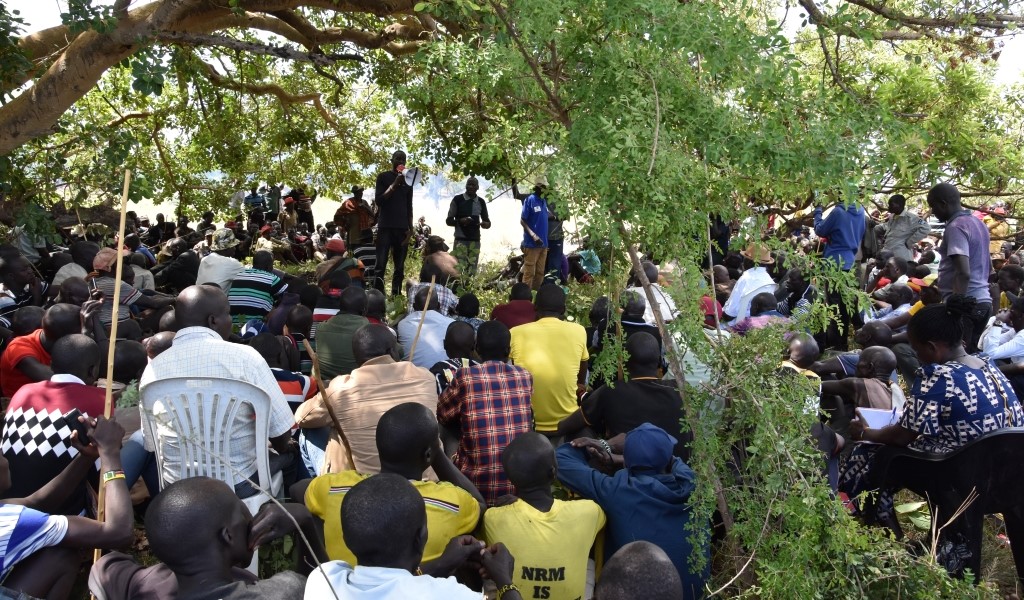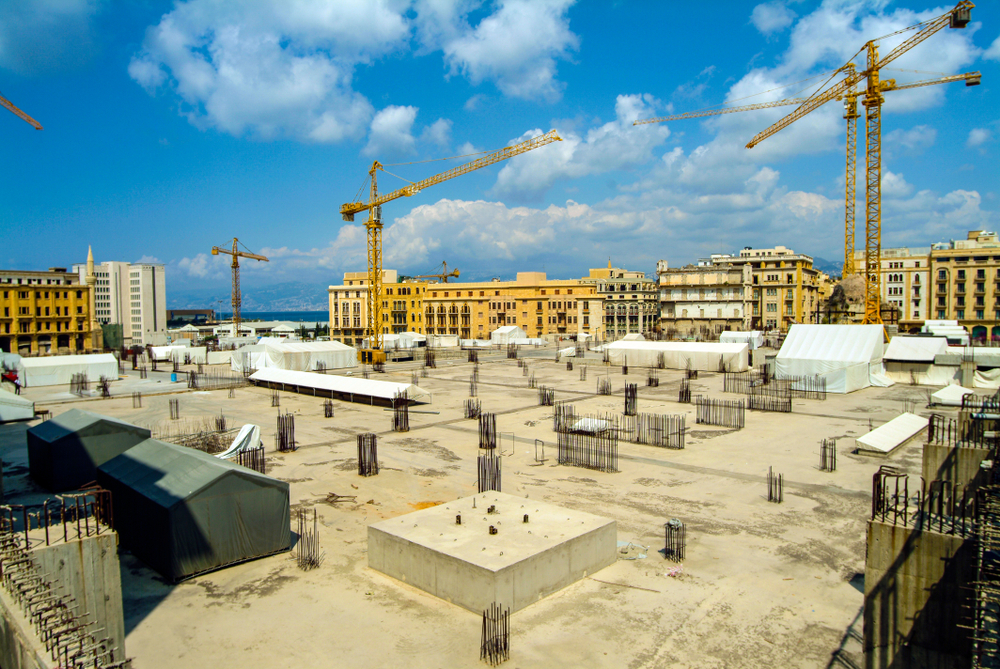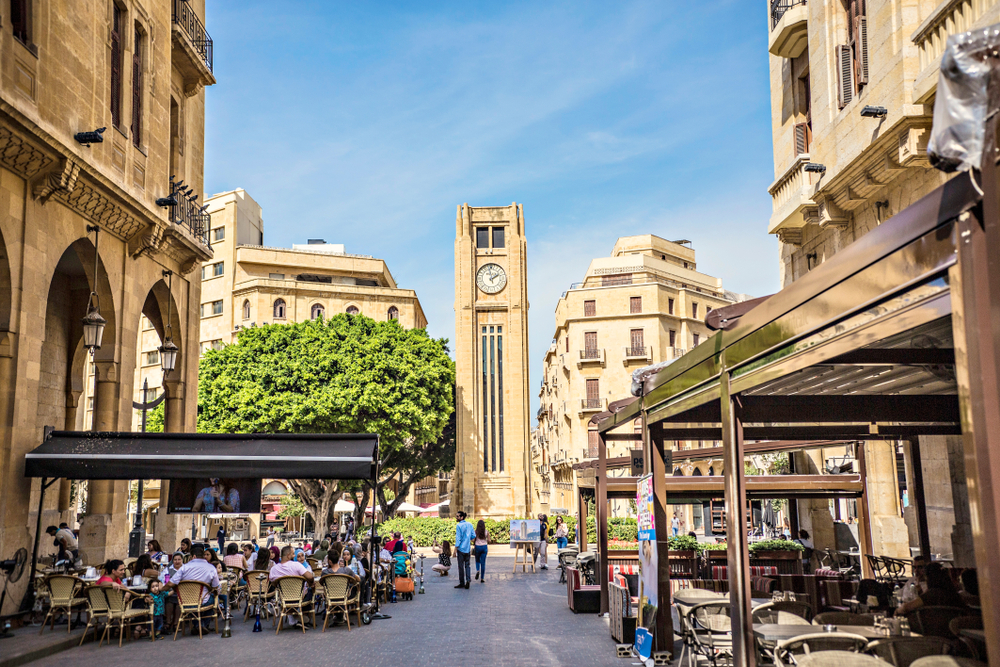They are a group of Lebanese muscular tattooed men dressed in uniform black t-shirts, some of them heavily bearded, and carrying provocative religious iconography and symbols.[i] They are not Muslims, but Christians. They call themselves Jnoud al-Rab (Soldiers of God) and lead their own political, religious, and spiritual uprising, guided by the word of Jesus Christ as they interpret it.[ii] Their coat of arms is shown on their cars, mopeds, and t-shirts: a picture of the wings of Saint Michael the Archangel and a shield decorated with the cross of Jesus Christ, all sitting above the Holy Bible.[iii]
Soldiers of God claims that it carries out the teachings of Jesus Christ and is entrusted with his commandments. It defines itself as neither a party nor an organisation, but a militia group formed with the aim of protecting Christians and offering reassurances to residents worried about rising levels of crime – including armed robberies, carjackings, handbag snatches, and the theft of internet and telephone cables – in the majority Christian neighbourhood of Achrafieh in Beirut.[iv]
Self-security in Beirut is already a concern as Hezbollah conducts security patrols, checks the identities of passing citizens, interferes in the movements of the Lebanese security services, and blocks journalists from moving freely in the areas under its control.[v] The rise of far-right Soldiers of God has raised fears that Achrafieh will join this self-securitisation and paramilitary policing phenomenon, bringing Beirut back to the time of the Lebanese civil war (1975-1990) when the state collapsed, militants controlled the streets, and the city was ideologically divided into the Christian East and Muslim West. These fears are increasing in light of the ongoing political paralysis and economic depression that has afflicted Lebanon since 2019, which crippled the state apparatus and is fuelling poverty in the worst shock since the civil war.[vi]
Read the full article here, originally published on the ICSR website.
[i] L’orient Today (2022) Who are Achrafieh’s Soldiers of God? [Online] available from https://today.lorientlejour.com/article/1304447/who-are-ashrafiehs-soldiers-of-god.html
[ii] Soldiers of God (2023) [Facebook] 25 July 2023. Available at https://www.facebook.com/photo/?fbid=670093338494283&set=a.628163606020590
[iii] Ibid.
[iv] Jnoud El Rab (2023) About Us [online] available at https://www.jnoudelrab.com/about-us/;
Reuters (2022) Beirut neighbourhood watch echoes troubled past [online] available at https://www.reuters.com/world/middle-east/beirut-neighbourhood-watch-echoes-troubled-past-2022-11-27/
[v] AlHurra (2022) The Eyes of Achrafieh… guardian angels or an introduction to self-security and division in Beirut? Translated by El Kari, Mohamad. [Online] available at https://bit.ly/3wysNVf
[vi] Ibid.
Dr Nafees Hamid interviews Dr Hannes Rusch about his work examining the ‘logic’ of intergroup conflict.
Dr Rusch talks us through the basic models which explain why groups might choose conflict, and highlights key questions that remain unanswered by the research.
You can also listen to the King’s College London War Studies podcast on their platform, where this episode was originally published.
In this episode, Dr Costanza Torre and Dr Fiona McEwen discuss XCEPT’s research in South Sudan, which aims to understand how experiences of conflict may lead someone to engage in violent, instead of peaceful, behaviour. They discuss the importance of hiring local researchers, the challenges of carrying out research in South Sudan, and how mental health disorders may be understood differently in South Sudan.
*This episode was recorded in early March 2024, before the recent escalation of violence in Sudan.
‘Resilience’ has become a buzzword in the field of countering violent extremism (CVE), but how useful is it?
In this episode, Federica Calissano interviews Dr Nafees Hamid about the benefits and drawbacks of CVE initiatives which focus on building resilience to violent extremism.
You can also listen on the King’s College London War Studies podcast channel, where this episode was originally published.
Read Federica’s XCEPT blog post: What do we mean when we talk about ‘resilience’ to violent extremism?
In recent years, numerous citizens of the KRI have lost their lives trying to cross the English Channel in small boats. Many people moving from the region to Europe and the UK since 2014 have done so in response to corruption and political conflict in the Kurdistan Region of Iraq (KRI). Since its creation in 1991 with the support of the US and the UK, the KRI has been under tight control of two main parties: the Patriotic Union of Kurdistan (PUK) and the Kurdistan Democratic Party (KDP). Ruling the region through a duopoly, the PUK/KDP have provided little power, resources and economic opportunities to citizens who fall outside their own clientelist and patronage networks.
Party dominance and corruption, combined with years of conflict over resource-sharing with the central government in Baghdad, have compounded the KRI’s financial and economic crisis and generated strong incentives for the region’s citizens to migrate using available smuggling networks. The KRI is riddled with active smuggling networks that make it possible for citizens from the region to invest their entire life savings in the hope of relocating to the UK to begin anew, highlighting the deep-seated desire for change and a better life away from the systemic issues plaguing their homeland.
Chatham House XCEPT research highlights the involvement of both local and international actors in a complex web of human smuggling, which capitalizes on the desperation of individuals seeking better lives. This transnational network exacerbates the plight of its victims, exploiting their circumstances for profit. The recent arrests have once again brought to light the issue of Kurdish migration, which for years has been driven by political corruption and conflict within the KRI, facilitated by transnational networks.
Read the full blog here, originally published on the Chatham House website.
I just came back from the 2024 Stockholm Forum on Peace and Development hosted by SIPRI. It was a stimulating event, replete with doom and data, attended by a throng of practitioners, activists and researchers, many doing remarkable things to put our fractured world to rights.
I was there with Simon Long’oli, Director of the Karamoja Development Forum, a community organisation in northern Uganda, where violence is an everyday reality. Simon and I were there to provoke colleagues on their notions of what constitutes good evidence in situations of violence and conflict.
We were arguing that community action research offers not only deep insight but also reaches the parts other research doesn’t reach. We were being cheeky, because we know that good qualitative and quantitative research has the capacity to be pivotal too. Nonetheless, in our experience, traditional research often does little to bring the community onside. What’s missing is research that systematises the knowledge and political energy of the people who suffer the violence.

Take Roger Mac Ginty’s idea of ‘everyday peace’. It’s not less important because it’s every day, but more important because it’s the way in which situations of peace or insecurity come into being. If people’s efforts to make life safe and productive are well enough organised and powerful enough, then the place and people will be at peace. If they are constantly thwarted, then their distrust of the authorities and politicians will put them on the defensive – every day. More foot soldiers, more crime, more despair.
At least that is what Simon and his community colleagues found when they led community action research on the Uganda-Kenya border.
To read the full blog, visit the IDS website, where this was originally published.
After two decades of violent conflict in the city of Mosul, Iraq, Dr Omar Mohammed, founder of the Mosul Eye organisation, started a tree-planting initiative to help bring communities together. In the United States, Dr Marc Zimmerman examined how greening and improvement initiatives reduced crime in cities that had suffered economic decline.
In this episode, Dr Omar Mohammed and Dr Marc Zimmerman, interviewed by Dr Nafees Hamid, discuss the role of greening initiatives in these two different contexts, exploring how they can promote peace, build trust between communities and authorities, and help to increase resilience against violent crime and extremism.
You can also listen on the War Studies podcast page, where this was originally released.
Beirut is the posterchild for a divided city.[i] 15 years of fighting during Lebanon’s civil war (1975-1990) saw the capital city split by ethnic, religious, and physical lines. These divisions did not end with the war. Over three decades later, sectarianism, segregation, economic inequality, and violence are a lasting part of Beirut’s post-war legacy.
The physical reconstruction of the city centre in post-war Beirut is believed to have played a role in these enduring divisions. When the reconstruction process began, many Beirutis saw it as an opportunity for society to heal. The public domain could be remade and revived, and in this way a space for reconciliation would be built.

Solidere building site in Beirut. Credit: Shutterstock/David Dennis
Instead, the work, which was carried out by the private company Solidere, has been accused of promoting a culture of ‘amnesia’ around the civil war, as well as exacerbating socio-economic divisions. When Solidere rebuilt Downtown Beirut, they sought to remove all physical remnants of the war. In their place, a shiny new imagined centre was built.
But burying traces of war does not necessarily mean the past is buried too – and failing to create a unified space may be contributing to a divided society.

Nejmeh Square in Downtown Beirut. Credit: Shutterstock/Sun_Shine
Solidere’s reconstruction process, which began shortly after the war ended, seemed set on destroying all traces of recent history, and streets and buildings quickly fell prey to the bulldozers. By 1993, 80 per cent of structures in Downtown were damaged irreparably – yet only a third of this had been caused by the war itself.[ii]
For many, Solidere’s reconstruction of Downtown is the embodiment of the state’s policy of amnesia. The Taif Accord signed in 1989 to formally end the civil war proclaimed that there was ‘no victor and no vanquished’ in Lebanon. It suggested no mechanism for dealing with the legacy of fighting, nor did it mention victims. By circumventing the issue of responsibility, the state could begin to move forward. At the same time, it encouraged a culture of forgetting, leading to accusations of a state-sponsored amnesia in the country. One activist noted that ‘the downtown is the core of the reconstruction ideology — that we don’t need to look at the past’.[iii]
It’s been claimed that, for ‘communities of difference’ to be successful, there must be a ‘studied historical absentmindedness’.[iv] Given a general amnesty law in 1991, a broadcasting censorship law in 1994, and a law in 1995 enabling ‘the missing’ to be classified as ‘dead’, it seems unlikely that remembering the past would yield justice in the present. This ‘amnesia’ could therefore help to promote harmonious co-existence.[v] For some, forgetfulness is seen as ‘an antidote to future conflict’.[vi]
Read the full blog on the ICSR website here.
When conflicts arise around fragile or contested borders, there are knock on effects that impact local, national and regional economies, as well as relationships between state and non-state actors. XCEPT’s Local Research Network partners are studying examples of such disruptions in different regions. In Syria, Kheder Khaddour looks at the northern region, where the border with Türkiye represents a lifeline for the millions of people displaced by Syrian civil war. Azeema Cheema studies the shifting relationship between authorities in Pakistan and Afghanistan since the Taliban’s takeover, and the effect on trade and migration policies at their shared border. Lastly, Ahmed Musa explains what’s been happening in Las Anod, a major trading hub in the Horn of Africa that has been destabilised by competing actors vying for influence.
Disclaimer: The opinions, findings, and conclusions stated herein are those of the speakers and do not necessarily reflect those of the partner organizations or the UK government.
XCEPT researchers Renad Mansour and Zmkan Ali of Chatham House join the On Geopolitics crew to discuss their new XCEPT report on cross-border conflict. Why is Sinjar, stuck between Iraq and Syria, enmired in other ongoing conflicts? And can anything be done to improve the situation in Sinjar while those conflicts are unresolved?
Renad and Zmkan argue that according to their latest XCEPT research, unless the non-state armed groups active in Sinjar are involved in negotiations about the future of Sinjar, there can be no lasting resolution.
XCEPT Chatham House researchers Tim Eaton and Leah de Haan (Chatham House Middle East and North Africa Programme) discuss their XCEPT research on the transnational links between the movement of people and armed conflict – from Edo State in Nigeria, through Niger, to Libya.
As the devastating war in Sudan nears the one-year mark, it remains fuelled by transnational military business networks. One such sector funding the military activities in Sudan’s gold sector.
In this episode, XCEPT researcher Ahmed Soliman discusses his upcoming research on the Sudan conflict and its link to the gold sector – from how gold has evolved as a ‘conflict good,’ its connection to the current war and transnational dynamics.
Dr Suliman Baldo (Executive Director, Sudan Transparency and Policy Tracker) gives an overview of key political shifts in Sudan’s history that have facilitated links with the country’s gold sector.
Denise Sprimont-Vasquez joins the podcast to discuss the economic activities and illicit networks that are fuelling the war.